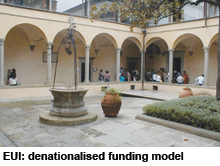Europe: Pan-European varsity’s struggle
Entering the European University Institute (EUI) has echoes of stepping back in time to one of the early monastic seats of higher education. Its hub, housed in a Medici-era church and monastery, sits high in the hills above Florence in San Domenico di Fiesole. Today the ancient cloisters are paced by serious-minded young scholars deep in thought or the occasional visiting Dominican priest.
With few distractions in this secluded academic outpost, the life of the scholar appears to have changed little since Giovanni Boccaccio wrote The Decameron in a nearby villa in the 14th century. However, despite its similarities with the early centres of learning which would evolve into Europe’s oldest universities, EUI could justifiably claim to be one of the continent’s most dynamic, modern centres of higher education.
 Established in 1976 by the European Union, the non-denominational institution is one of just a handful of genuinely “international” universities not linked to the academic traditions or governmental demands of a single country.
Established in 1976 by the European Union, the non-denominational institution is one of just a handful of genuinely “international” universities not linked to the academic traditions or governmental demands of a single country.
That is partly due to the institute’s “denationalised” funding model, in which about 20 EU member states finance a number of social science Ph D students each year, with the EU picking up the bill for administration costs and rent of premises. “The idea was that the university would be funded by a group of countries and to belong to all of them, but also to none of them,” explains Marise Cremona, the university’s interim president and professor of European law.
Although English is the lingua franca of its classrooms, the EUI’s “stateless” nature makes it particularly welcoming to new staff and students, says Cremona. “Even a highly international institution like the London School of Economics is still a British institution and foreign students are hosted by the UK. Here, there are no hosts and no guests,” she says.
Exposure to international staff and students also equips graduates for successful careers in academia, finance and international law across Europe. A survey of 2,500 alumni found that almost 70 percent are working in academia. In comparison, just 38 percent of UK-based Ph D graduates in social sciences opted for careers in higher education. A further 10 percent of the institute’s Ph D graduates are working in international organisations such as the European Central Bank and the World Bank, 10 percent for governments and another 10 percent in the private sector, often as bankers or lawyers.
But despite the success of EUI graduates in the job market and the institution’s strong record in attracting large-scale European Research Council grants, the idea of a pan-European university has never really taken off. Repeated calls from Jo Ritzen, the Dutch former education minister, to merge a cluster of universities located near the borders of Germany, the Netherlands and Belgium have fallen on deaf ears for the past decade, while mooted versions of an EUI devoted to science have also failed to materialise. On the contrary, Britain withdrew its postgraduate funding two years ago for institutions similar to EUI — including the College of Europe’s branches in Bruges, Belgium and Natolin, Poland — although it maintains its support for EUI.
The university believes its role in promoting student and staff mobility across Europe is as important to the international academy as the research it produces itself. By providing a different academic experience to scholars often entrenched in their own national systems or just one university, academics can learn from each other and take good practice home with them. “Undergraduates should never do their Ph D studies where they studied as an undergraduate, and academics should never hire their own Ph D researchers,” says Andreas Frijdal, EUI’s academic director. “This idea is understood in the US, but is resisted by lots of European academics, who often stay in one place. You can, of course, come back to your university, but it’s vital to spend a period of time away from it.”
(Excerpted and adapted from Times Higher Education)















Add comment